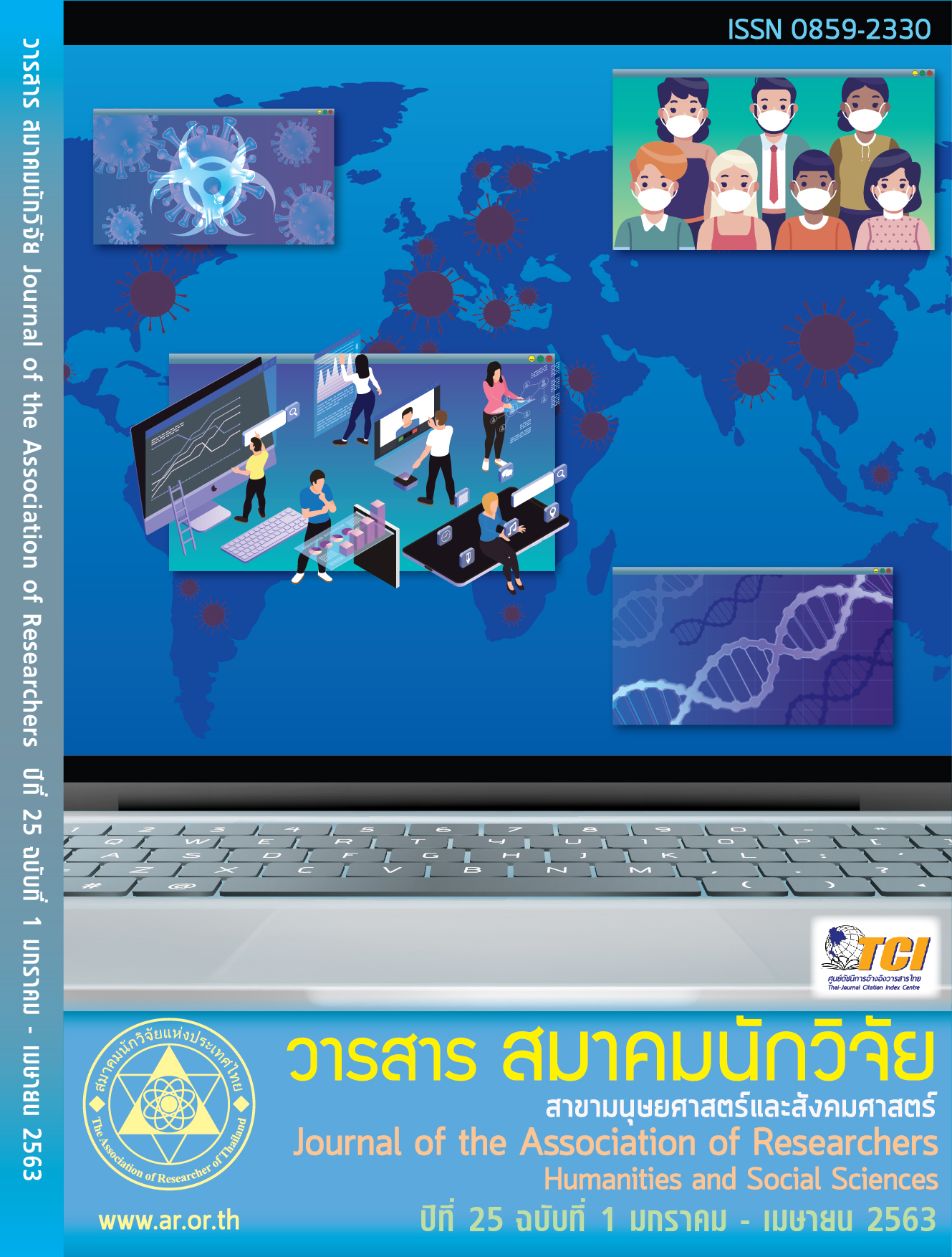A guideline of Development of competitive Competency of Processed Coconut Products in Ratchaburi Province with the Philosophy of Sufficiency Economy
Main Article Content
Abstract
The objectives of this research are to 1) study the processed coconut products produced by the entrepreneurs in Ratchaburi province, 2) study decision making of consumers toward purchasing processed coconut products. 3) to investigate how to develop the competitive competency of processed coconut products with the philosophy of Sufficiency Economy. In the process of data collection, a questionnaire is collected with 350 accidental samplings; moreover, purposive sampling of 7 entrepreneurs of processed coconut products in Rachaburi are interviewed with a semi-structured interview. In order to analyse data, both descriptive statistics such as frequency, percentage, mean, Standard Deviation and Content Analysis are applied in this research.
The result from this descriptive statistics suggests that, 1) in Ratchaburi, there are processed coconut products as follows; aromatic coconut transferred to trimmed coconut, aromatic coconut jelly, pure coconut juice, sugar-coated coconut, dried coconut, a can of coconut milk and coconut oil. 2) According to the marketing factors influencing on the decision making to purchase processed coconut products, they mostly claim that processed coconut products are good for health and safely. Furthermore, the taste and quality of the products also impacts on the decision making. However, the price must be reasonable and consistent with both quality and quantity of the products.The distribution of the products should be effective and reliable. The entrepreneurs should provide the marketing strategy to impact on the consumers’ intention. 3) A development of competitive competency is that coconut agriculturists should provide a good quality of coconut. In term of entrepreneur, they should develop their equipment which effects on the price and support their staff to improve their skills; moreover, the entrepreneurs should make their staff feel like their own relatives. The development of new coconut products should be consistent with the need of consumers. Additionally, the entrepreneurs should provide the marketing strategy with a new generation who need to take care of their health. Lastly, the entrepreneurs must operate their business with faithfully, and the business should be honest with consumers and shareholders. To strengthen a cooperation of providing a coconut resource in a medium and huge industry, the entrepreneurs should seek for government section and related institutes.
Article Details
บทความที่ปรากฏในวารสารนี้ เป็นความรับผิดชอบของผู้เขียน ซึ่งสมาคมนักวิจัยไม่จำเป็นต้องเห็นด้วยเสมอไป การนำเสนอผลงานวิจัยและบทความในวารสารนี้ไปเผยแพร่สามารถกระทำได้ โดยระบุแหล่งอ้างอิงจาก "วารสารสมาคมนักวิจัย"
References
สืบค้นเมื่อวันที่ 1 กันยายน,2561, จากเว็บไซต์: www.ag.ebook.lib.ku.ac.th/eBooks.
คณะอนุกรรมการขับเคลื่อนเศรษฐกิจพอเพียง.(2547). เศรษฐกิจพอเพียงคืออะไร.
กรุงเทพฯ : สำนักงานคณะกรรมการพัฒนาการเศรษฐกิจและสังคมแห่งชาติ.
คณะอนุกรรมการขับเคลื่อนเศรษฐกิจพอเพียง. (2550). การประยุกต์ใช้หลักเศรษฐกิจพอเพียง.
กรุงเทพฯ:สำนักงานคณะกรรมการพัฒนาการเศรษฐกิจและสังคมแห่งชาติ.
ชัยฤทธิ์ ทองรอด และวราภรณ์ สารอินมูล. (2559). พฤติกรรมการเลือกซื้อสินค้าในตลาดนัดกลางคืนของ
ผู้บริโภคเขตกรุงเทพมหานคร,วารสารสมาคมนักวิจัย, 21(3), 197-209.
ณดา จันทร์สม. (2555). ธุรกิจกับปรัชญาเศรษฐกิจพอเพียง. สืบค้นเมื่อวันที่ 12 กันยายน , 2559,
จากเว็บไซต์ : http://cse.nida.ac.th/main/images/SustainableBusiness.pdf.
ธานินทร์ ศิลป์จารุ. (2555). การวิจัยและวิเคราะห์ข้อมูลทางสถิติด้วย SPSS
และ AMOS. นนทบุรี: เอส อาร์ พริ้นติ้ง แมสโปรดักส์.
นิเวศน์ ธรรมะ ประพันธ์ วงศ์บางโพ พลอมร ธรรมประทีป สมบูรณ์ ศรีอนุรักษ์วงศ์
สรยุทธ งามจันทร์ผลิ และวรางคณา งามจันทร์ผลิ, ผู้แปล . (2552). การจัดการตลาด. กรุงเทพฯ : แมคกรอ-ฮิล.
ประภาพร กิตติเสนาชัย. (2561). ศักยภาพในการแข่งขันของมะพร้าวไทย. สำนักงานนโยบายและยุทธศาสตร์การค้า.
สืบค้นเมื่อวันที่ 30 สิงหาคม, 2561, จากเว็บไซต์: http://www.tpso.moc.go.th/sites/default/files/1064-img.pdf.
พรชนก ทองลาด ไพฑูรย์ อินต๊ะขัน และบัณฑิต บุษบา. (2559). แนวทางการพัฒนาธุรกิจให้มีความยั่งยืนตาม
ปรัชญาเศรษฐกิจพอเพียงของธุรกิจขนาดกลางและขนาดย่อมในจังหวัดลำปาง ลำพูน และเชียงใหม่,
วารสารสมาคมนักวิจัย, 21(1), 74-87.
พิพัฒน์ ยอดพฤติการ.(2555). เศรษฐกิจพอเพียงกับการดำเนินธุรกิจ. กรุงเทพฯ: โทเทิ่ล แอ็คเซ็ส คอมมูนิเคชั่น.
วัชรมงคล เบญจธนะฉัตร์. (2559). Bathroom Design บริษัทสัญชาติไทยกับมาตรฐานระดับโลก. สืบค้นเมื่อ
วันที่ 1 กรกฎาคม,2559, จากเว็บไซต์: http://community.akanek.com/th/story/2010/07/bathroom- design-interview.
สุขสรรค์ กันตะบุตร. (2550). การศึกษาการประยุกต์ปรัชญาของเศรษฐกิจพอเพียงในภาคธุรกิจ. การประชุม
เสนอผลงานวิจัยระดับบัณฑิตศึกษาแห่งชาติ วันที่ 1 สิงหาคม 2550 มหาวิทยาลัยกรุงเทพฯ .
สุภาวดี ขุนทองจันทร์. (2553). มูลเหตุจูงใจในการปรับใช้เศรษฐกิจพอเพียงของวิสาหกิจขนาดกลางและขนาดย่อม,
วารสารวิชาการมอบ, 12(2), 86-95.
References
Benjathanachat, W. (2016). Bathroom Design Thai company with global standard. Retrieved July 1, 2016,
from http://community.akanek.com/th/story/2010/07/bathroom-design-interview. (in Thai).
Chunsom, N. (2016). Business with Sufficiency Economy Philosophy. Retrieved September 12, 2016,
from http://cse.nida.ac.th/main/images/SustainableBusiness.pdf. (in Thai).
Cronbach, L. J. (1974). Essentials of Psychological Testing. 3rd ed. New York : Harper & Row.
Department of Agricultural Extension. (2561). Coconut and coconut product value added. Retrieved
September 1, 2018, from http://www.ag.ebook.lib.ku.ac.th/eBooks. (in Thai).
Kantabutra, S. (2007). A study of the application of sufficiency economy philosophy in business sector.
The 1st National Graduate Research Conference, 1August 2007, Bangkok University. (in Thai).
Khunthongjan, S. (2010). Motivation on Sufficiency Economy Application for SMEs.Journal of
Science & Technology Ubon Ratchathani University, 12(2), 86-95. (in Thai).
Kittisenachai, P. (2018). Competitiveness of Thai Coconut. Trade Policy and Strategy Office.
Retrieved August 30, 2018, from http://www.tpso.moc.go.th/sites/default/files/1064-img.pdf. (in Thai).
Kotler,P. (1999). Kotler on Marketing. New York : Simon & Schuster.
Silpcharu, T. (2012). Research and analysis of statistical data with SPSS and
AMOS. Nonthaburi:S.R. printing massage products. (in Thai).
Subcommittee on Sufficiency Economy Philosophy. (2004). What is Sufficient economy. Bangkok :
Office of The National Economic and social Development Board. (in Thai).
Subcommittee on Sufficiency Economy Philosophy.(2007). Application of Sufficient economy.
Bangkok: Office of The National Economic and social Development Board. (in Thai).
Tumma, N. et al, Trans. (2009). Marketing the core. Bangkok : McGraw- Hill. (in Thai).
Thonglard, B., Intakhan, P., & Boodsaba, B. (2016). Guidelines for Improving the Sustainable Business
According to Sufficiency Economy Philiosophy of SMEs in Lampang Lumphun and Chiang Mai.
Journal of the Association of Researchers, 21(1), 74-87. (in Thai).
Thongrawd, C & Saninmool, V. (2016). Consumers’ Buying Behaviors of Products in Night Markets in
Bangkok Metropolitan, Journal of the Association of Researchers, 21(3), 197-209. (in Thai).
Yodprudtikan, P. (2012). Sufficiency Economy with Business.
Thaipat Institute. Bangkok : Total Access Communication.(in Thai)


